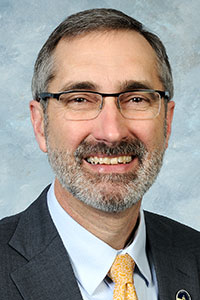
FRANKFORT, Ky. — A performance-based higher education funding model passed into law two years ago is working for Kentucky’s two research universities, state lawmakers were told today.
University of Kentucky President Eli Capilouto and University of Louisville President Neeli Bendapudi told the Interim Joint Committee on Appropriations and Revenue that they favor the formula, which allocates a portion of state funding based on a university’s performance on 11 key metrics. UK recently outperformed the average in 10 of those metrics while U of L outperformed the average in four of the metrics, according to the universities’ leaders.
The performance-based funding model was created in 2017 with the passage of Senate Bill 153, sponsored by Senate President Pro Tempore David P. Givens, R-Greensburg. It is gradually replacing what Givens called the “shares allocation” model that based funding on each postsecondary institution’s share of the state’s postsecondary budget.
The model is being phased in at the state’s universities and community colleges over a three-year period beginning with fiscal year 2018-2019, according to the Kentucky Council on Postsecondary Education (CPE).
Givens, who serves on the Interim Joint Committee on Appropriations and Revenue, thanked Capilouto and Bendapudi for their support of the performance formula, now in its second year. The goal, ultimately, is to push the state’s postsecondary institutions closer to the national average in degree attainment, he said.
“If we can get to that place – almost at the national average for postsecondary degree attainment – we can change the economy in Kentucky in great, vast ways, so thank you,” Givens told his colleagues on the committee.
Rep. James Tipton, R-Taylorsville, questioned Capilouto on whether he thinks UK and the state’s other research university, U of L, should be categorized differently under the new funding model. Some argue they should, Tipton said.
“Some people seem to think it would be better if our research universities were in a separate category from our regional universities in how performance-based (funding) works. I’d like to hear your comments on that,” he said.
Capilouto said his support for the model is based on the “commonality” of undergraduate education.
“There is a commonality in this performance-funding approach, and it is the one thing that every university does,” said Capilouto. “I think it is an advantageous approach.”
Bendapudi agreed with Capilouto. Additionally, she asked lawmakers to consider increasing funding under the formula in the 2020 state budget session.
“I do request more allocation, if possible,” she told the committee. “Incentive funding works well when it’s new dollars. Otherwise, if it’s moving dollars, then obviously we get into you’re growing at the expense of something else.”
Testimony on research at the two universities was also shared with the committee. Research funding increased 26 percent in fiscal year 2019 alone at UK, one of four universities nationally to receive an $87 million grant to help reduce opioid deaths.
Dr. Sharon Walsh, the head of the grant project called the HEALing Communities Study, said the project goal is to reduce opioid deaths in 16 Kentucky counties by 40 percent in three years, with the project beginning this fall.
U of L is also making strides in its research, said Bendapudi. Research expenditures at that institution totaled over $176 million in 2018, she told lawmakers.




















Add Comment